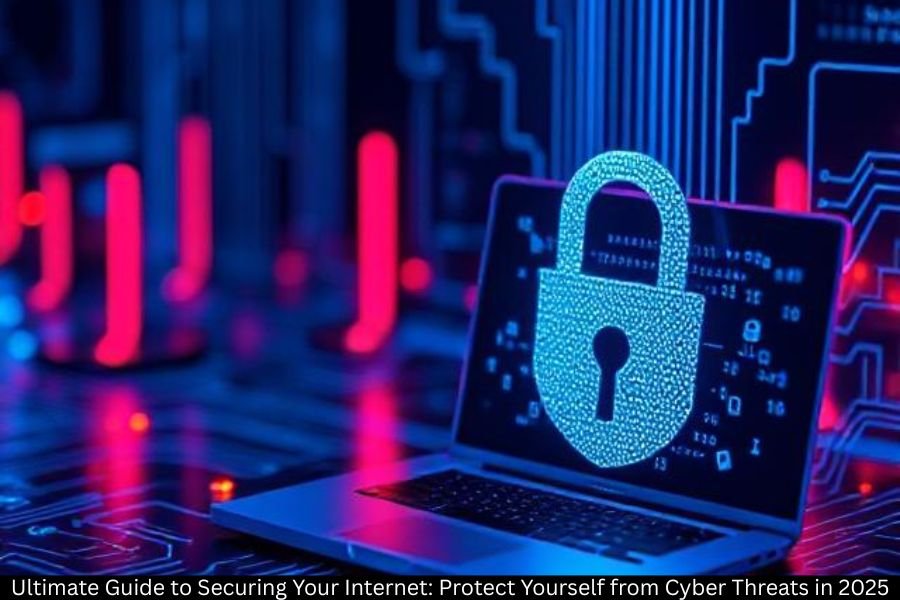The Internet is like a busy city – it is full of opportunities, but is also full of risks. Every time you go online, you open the doors for hackers, scammers and cyber criminals. Save yourself is not just smart – it is necessary. Dive into a practical, point-to-point guide to secure your internet from cyber hazards.
What are cyber threats?
Cyber threats are malicious efforts by hackers to damage, steal or disrupt data by hackers. These threats can hit anyone – personal, business or even governments. If you use the Internet, you are automatically a goal.
What are 7 types of cyber security threats?
Malware
Malid software such as viruses, insects and spyware are designed to damage or steal.
Fishing
Fake emails and messages that trick you to share personal details such as passwords or bank information.
Ransomware
Hackers lock your files and demand payment to unlock them.
Dos (DOS) attack
The attackers flooded a network with traffic, causing website and app accidents.
Man-in-Midal Attack
Hackers secretly prevent communication between you and a website.
SQL injection
A hacker snatches malicious code in websites to steal or manipulate a database.
Yearning
Employees or reliable individuals who misuse access to data.
What are the 5 main threats for our cyber security?
- Data violation – when hackers steal personal or financial data.
- Identity theft – Criminals copy you for fraud.
- Using public Wi-Fi without unsafe network-security.
- Weak password-to-un-masters credentials.
- Social Engineering Attack – To deceive people.
Why are your internet cases safe
Think of your digital life: bank details, emails, private chats, photos and work files. Without safety, you are handing the key to the criminals. A single cyber attack can cause you money, privacy and peace of mind.
What are the top 5 methods that you can protect yourself from cyber attacks?
- Use strong, unique password – mix number, symbol and letter.
- Enable two-factor authentication (2fa)-adds another security layer.
- Keep the software updated – fix the known safety holes.
- Install antivirus and firewall – the first line of defense against dangers.
- Be alert online – Do not click suspicious links or attachments.
5 What are internet safety tips?
- Avoid public Wi-Fi for banking or sensitive work.
- Use a VPN for private browsing.
- Backup your data regularly.
- Share limited personal information online.
- Always log out of accounts after use.
Best practice for safe internet use
Behave the Internet like driving – be cautious. Go only to safe websites (https: //), check for spelling errors in the URL, and avoid downloading random files.
Antivirus and firewall role in cyber security
The antivirus scans for malware, while firewalls block unauthorized access. Think the antivirus as a guard dog and as a closed gate as a firewall.
How to secure your home Wi-Fi network
- Change the default router password.
- Enable WPA3 encryption.
- Hide your Wi-Fi name (SSID).
- Create guest networks for visitors.
Importance of regular software updates
Hackers love the old system. The updates are like the vaccine booster – clining those intervals that exploit the attackers.
How Business Business can secure your system
Business are the major goals. They should train employees, encrypt data, and run regular security audit to prevent massive violations.
Future of cyber dangers
With AI, IOT and Cloud-based systems, cyber hazards are becoming smarter. The attackers use AI to mimic real users, and unsafe smart tools can be the entry points for hackers.
Quick cyber security checklist
- Use strong, unique password
- Enable 2fa
- Update devices and apps
- Backup data weekly
- Use antivirus and VPN
- Be cautious for suspicious activity
conclusion
Internet is powerful, but it is also risky. By following simple safety practices-using strong passwords, enabling 2FA, and securing Wi-Fi-can significantly reduce cyber threats. Think as locking your digital doors and windows before going out.
questions to ask
What are 7 types of cyber security threats?
They include malware, phishing, ransomware, dos attack, MITM attack, SQL injection and Insider.
What are the top 5 methods that you can protect yourself from cyber attacks?
Strong password, 2fa, software updates, antivirus/firewall, and alert online behavior.
5 What are internet safety tips?
Avoid public Wi-Fi, use VPN, share backup data, less information, and log out after use.
What are the 5 main threats for our cyber security?
Data violations, identity theft, unsafe network, weak passwords and social engineering.
Why is a VPN important for safety?
It hides your IP, encrypse traffic, and prevents hackers from tracking your online activity.
